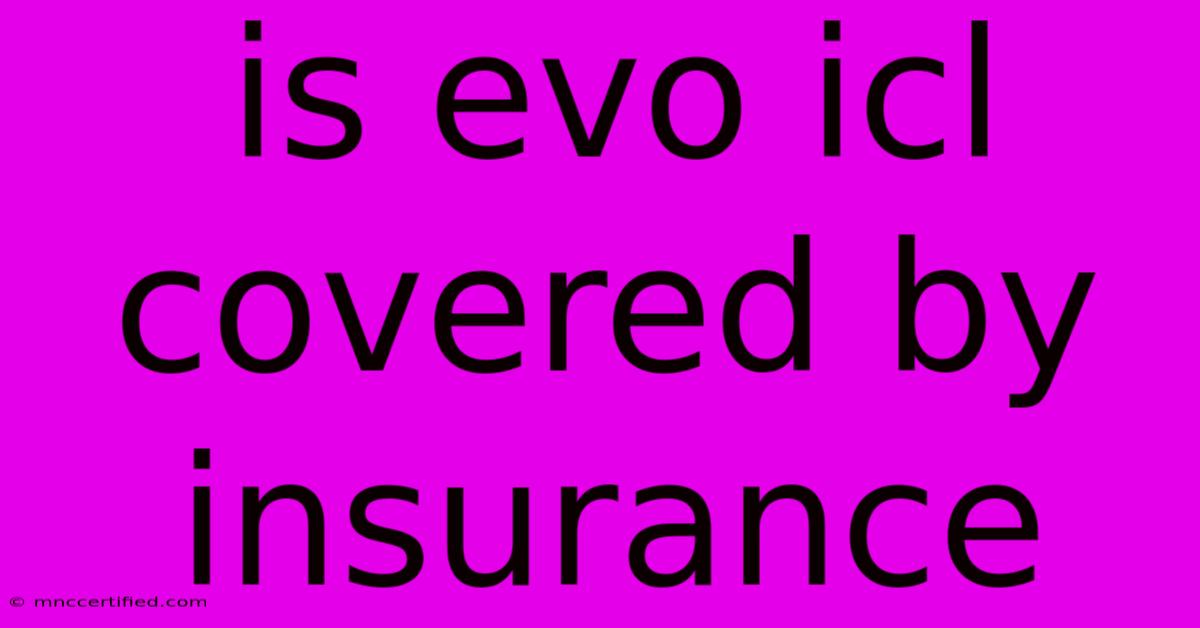Is Evo Icl Covered By Insurance

Table of Contents
Is EVO ICL Covered by Insurance? A Comprehensive Guide
Eye surgery, especially advanced procedures like the EVO ICL (Implantable Collamer Lens), often sparks the crucial question: Is EVO ICL covered by insurance? The short answer is complex: it depends. While many insurance providers don't explicitly cover elective refractive procedures like EVO ICL, several factors can influence your eligibility. This comprehensive guide explores these factors, providing you with the information needed to navigate the insurance landscape and understand your options.
Understanding EVO ICL and Insurance Coverage
The EVO ICL is a premium vision correction procedure offering a refractive alternative to LASIK and other surgeries. It involves implanting a small, biocompatible lens inside the eye to correct nearsightedness, farsightedness, and astigmatism. Because it's considered an elective procedure – meaning it's not medically necessary to correct a vision impairment affecting daily life – insurance companies typically don't cover the full cost.
What Factors Influence Insurance Coverage?
Several key factors determine whether your insurance might partially or fully cover your EVO ICL procedure:
-
Specific Insurance Plan: Your individual insurance policy's terms and conditions play the most significant role. Some plans might offer partial coverage for vision correction surgeries under specific circumstances, while others might offer none. Carefully review your policy documents or contact your insurance provider directly. Don't rely solely on online summaries.
-
Medical Necessity: While EVO ICL is primarily elective, some cases might qualify for insurance coverage if the procedure is deemed medically necessary. This is rare and typically requires documentation from your ophthalmologist demonstrating a significant medical reason for the procedure beyond simple vision correction. Examples could include severe corneal conditions precluding LASIK or a high refractive error causing significant functional impairment.
-
Pre-existing Conditions: Pre-existing eye conditions might influence coverage. If you have a condition that makes EVO ICL a more suitable and necessary procedure than other options, your doctor’s detailed explanation might sway your insurer.
-
Policy Exclusions: Many insurance plans explicitly exclude elective cosmetic procedures. EVO ICL, although offering vision correction, is often categorized under this umbrella.
How to Maximize Your Chances of Coverage
Even though full coverage is unlikely, you can increase your chances of partial reimbursement:
-
Obtain Detailed Documentation: Work closely with your ophthalmologist to obtain comprehensive medical documentation outlining why EVO ICL is the most appropriate and potentially medically necessary procedure for your specific situation. This detailed report should address any pre-existing conditions and potential complications avoided by choosing EVO ICL.
-
Appeal Denied Claims: If your initial claim is denied, don't give up. Carefully review the denial reason and prepare a strong appeal outlining the medical necessity and any extenuating circumstances. Provide all supporting medical documentation and highlight any inconsistencies in their reasoning.
-
Explore Flexible Payment Options: Most ophthalmology practices offer financing plans to help patients manage the cost of EVO ICL. These options can ease the financial burden, even without insurance coverage.
-
Negotiate with Your Provider: Some ophthalmologists might offer discounted rates or payment plans to facilitate access to the procedure.
Alternatives and Cost Considerations
If insurance coverage isn't feasible, consider these options:
-
Exploring other vision correction options: Evaluate less expensive alternatives such as LASIK or contact lenses to fit your budget.
-
Savings plans and budgeting: Start saving specifically for the procedure to spread the cost over time.
Remember: The cost of EVO ICL can vary significantly based on geographic location and the specific ophthalmologist. Obtaining multiple quotes is crucial before committing to the procedure.
Conclusion: Proactive Research is Key
Determining if your insurance covers EVO ICL requires diligent research and communication. Don't hesitate to contact your insurance provider directly and discuss your specific situation with your ophthalmologist. Thorough preparation and a clear understanding of your insurance policy are essential to making informed decisions about your vision correction journey. By following the strategies outlined above, you can navigate the insurance landscape and potentially secure some financial assistance for your EVO ICL procedure.

Thank you for visiting our website wich cover about Is Evo Icl Covered By Insurance. We hope the information provided has been useful to you. Feel free to contact us if you have any questions or need further assistance. See you next time and dont miss to bookmark.
Featured Posts
-
Bomb Scare In Chester Police Give Update
Nov 23, 2024
-
Ufc Macau Hernandez Wins Close Decision
Nov 23, 2024
-
Who Pays For A Conservator Bond
Nov 23, 2024
-
Upside Down Cross Diamond Chain
Nov 23, 2024
-
Make America Great Again Hat 2024
Nov 23, 2024